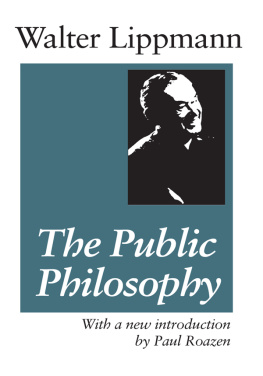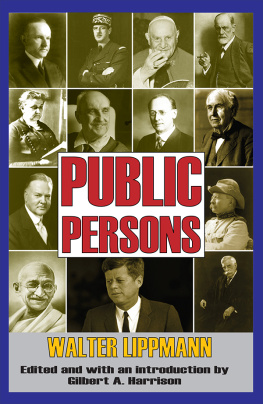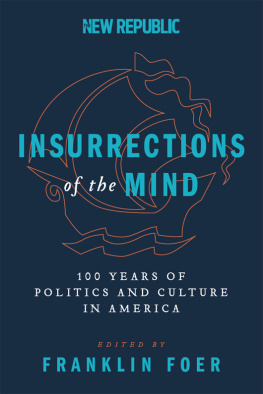FORCE
& IDEAS
Original edition 1970 by Liveright Publishing Corporation.
Published 2000 by Transaction Publishers
Published 2017 by Routledge
2 Park Square, Milton Park, Abingdon, Oxon, OX14 4RN
711 Third Avenue, New York, NY 10017, USA
Routledge is an imprint of the Taylor & Francis Group, an informa business
All rights reserved. No part of this book may be reprinted or reproduced or utilised in any form or by any electronic, mechanical, or other means, now known or hereafter invented, including photocopying and recording, or in any information storage or retrieval system, without permission in writing from the publishers.
Notice:
Product or corporate names may be trademarks or registered trademarks, and are used only for identification and explanation without intent to infringe.
Library of Congress Catalog Number: 99-046898
Library of Congress Cataloging-in-Publication Data
Lippmann, Walter, 1889-1974.
[Early writings]
Force and ideas : the early writings/Walter Lippmann ; with an introduction by Arthur Schlesinger, Jr.
p.cm.
Originally published: Early writings. New York : Liveright, [1970]
Includes index.
ISBN 0-7658-0620-7 (alk. paper)
1. United States-Politics and government1913-1921. 2. United StatesCivilization20th century. I. Title.
E766 .L574 2000
320.973'09'041dc21
99-046898
ISBN 13: 978-0-7658-0620-8 (pbk)
Walter Lippmann was twenty-four when, in 1913, he was invited by Herbert Croly, whom he had not met but whose Promise of American Life he had read, to help found The New Republic. A Preface to Politics had just been published and was soon to be followed by Drift and Mastery; Lippmann was already a recognized intellectual leader of his generation. Lincoln Steffens had picked him as the young man with the ablest mind that could express itself in writing. Lippmann caught on right away, Steffens later wrote; keen, quiet, industrious, he understood the meaning of all that he learned.
It was on Steffenss recommendation that Lippmann in 1912 went to Schenectady to work for the newly elected Socialist mayor, the Reverend George R. Lund, former pastor of a fashionable Presbyterian church. The episode was brief. From the start, Mr. Lippmann was a student of politics, rather than a practitioner.
The first issue of The New Republic (price: ten cents) came out on Saturday, November 7, 1914, and carried a lengthy comment by Lippmann on Force and Ideas. With time out during World War I as a captain in military intelligence, then as an aide to Colonel House before and after the Armistice negotiations, Mr. Lippmann was to remain on The New Republic staff until the fall of 1921. There were few weeks in which he did not write either notes or signed articles. Croly was first among equals, the acknowledged but untitled chairman of the editorial board; but Lippmann, along with the other editorsFrancis Hackett, Walter Weyl, Philip Littell and Alvin Johnsonwas free to develop his own themes and views.
The assembling of the writings in this book presented a problem other than the hardship of leaving out so much of merit. All the early New Republic files had mysteriously disappeared. Fortunately, Mr. Lippmann had kept most of his original manuscripts and deposited them at Yale University. By matching manuscripts against copies of The New Republic, the authorship of many unidentified notes was fixed. All of them were written for the week; that they are so little dated is the more remarkable. They appeared in a journal whose purpose, Mr. Lippmann said, was not partisan, factional, personal or ideological; it was educational; its editors wanted it to be informed, disinterested, compassionate and brave.
Since some of the personages and controversies described here have faded from memory, Arthur Schlesinger, Jr. in his annotations recreates the stage on which they moved.
Gilbert A. Harrison
Editor-in-Chief
The New Republic
ARTHUR SCHLESINGER, JR.
We are living and shall live all our lives now, Walter Lippmann wrote in The New Republic in 1917, in a revolutionary world. This proposition, which might be taken either as highly banal or highly incendiary, was in Lippmanns case a vivid and sustained perception of the radically unstable character of the time in which he was growing up.
Born in the Victorian tranquilities of 1889, he was stirred by the ferment of the Progressive era and became a socialist before he left Harvard in 1910. His socialism soon evaporated in any dogmatic form; but it left behind a residue in the shape of a belief in the necessity for rational planning and purpose to master the incipient chaos of modern society. He was one of the first Americans to read Freud, and this doubtless contributed to his sense that he was living in an age of the transvaluation of values.
It was a decade of the rise and collapse of great hopes. It began with the euphoria of Roosevelts 1912 campaign, the first campaign in American history to be based on a truly modern analysis of industrial society. When TR succumbed to jingoism, the young men transferred their dreams to Wilson; and for a season Wilson seemed to them a leader not only for America but for all mankind. Then Wilson, in their view, capitulated to the old order at Versailles, and the decade concluded in disillusion over the peace and in the shame of the Red Scare.
Whether optimistic or pessimistic about the chances of a policy of mastery prevailing over a policy of drift, Lippmann throughout these years had an intense conviction that the acids of modernity (his phrase a decade later in A Preface to Morals) were eating away at all the inherited certitudes. The revolution, he wrote in 1917, goes deeper than any man had dared to guess. Western civilization is approaching not the end of its potential resources, but the end of its resources as they are now organized. Reconstruction was the vital need of the age. A planless, drifting uncontrolled society, he said in 1914, is no longer fit to survive in the modern world. The underlying notion of modern radicalism has been to substitute a conscious social control for accident and confusion, to unify the nations resources so that they can be used for a purpose. In urging the task of reconstruction, however, Lippmann was animated more by commitment to reason than by faith in reasonor at least by faith in the capacity of reason to conquer the irrational in man. This tension between his passion for reason and his acknowledgment of irrationality accounts, I think, for the poignancy of much of his writing. We, too, can blunder into horror.
He had many doubts about the organization of the American government. Only the most revolutionary changes in the congressional system, he wrote in 1917, can save representative government in America. As for the Presidency:
The concentration of all vitality in the Presidency has become something like a disease in which there is feverish activity at the center, a cold inertia in all the parts. We expect of one man that he shall speak for the nation, formulate its needs, translate them into a program. We expect that man to instill these purposes and this program into a parasitic party system, drive his own party to enact them, and create an untainted administrative hierarchy through which to realize his plans. We expect him to oversee the routine, dominate group interests, prepare for the future, and take stock of possible emergencies. No man can do it. As the thing works today, if the President is absorbed in a foreign complication everything else comes to a dead stop. The President is burdened with the task of a benevolent despot and then denied the authority and resources to make even a despotism effective. In the system of checks and balances, it is the checks alone which seem to have much vitality.









